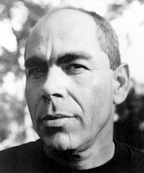LITR 4332: American Minority
Literature

Student Poetry Presentation 2004

“Immigrants
in Our Own Land”
Jimmy Santiago Baca
UA 8 - 9
Reader:
La Quita Rhone
Respondent: Tamrynn Fett
Biography:
http://www.progressive.org/jan03/intv0103.html
Jimmy Santiago Baca, of Mexican and Apache heritage, spent his early years in rural New Mexico and his adolescence in orphanages. Abandoned through death or leave-taking by everyone he loved, he became violent and bitter in his teen years. He turned to drug dealing and eventually went to prison for it. Now living in Albuquerque, he identifies fiercely with those who, like him, were tossed aside and persecuted because of skin color, poverty, or a lack of education. So, in addition to speaking and teaching at colleges and universities, he also works with inner-city students, gang members, illiterate adults, prisoners, and others in search of their own voices.
Literary
Objectives:
Objective 3c – “The Ambivalent Minority”
Objective 5a – To discover the power of poetry and fiction to help “others” hear the minority voice and vicariously share the minority experience.
Literary Term:
Imagery
The Bedford Glossary of Critical and Literary Terms defines imagery as a term used to refer to the actual language that a writer uses to convey a visual picture.
Read the Poem
Interpretation of
Poem:
The author uses very strong images of captivity, incarceration, and oppression. It seems that the author is moving back and forth between two worlds. On the one hand is the new world full of promises and better lives, and on the other hand is a world of disappointment and shattered dreams. The author comments:
We came here to get away from false promises,
From dictators in our neighborhoods,
Who wore blue suits and broke our doors down
When they wanted, arrested us when they felt like,
Swinging clubs and shooting guns as they pleased.
But it’s no different here. It’s all concentrated.
Questions:
- The
title of this poem is Immigrants in Our Own Land. How can a culture of
people be immigrants in their own land? Where in the poem is this
immigration status seen?
- What
effect does the author’s tone have on this particular poem?
- Are there real immigrants? If so, who are they?